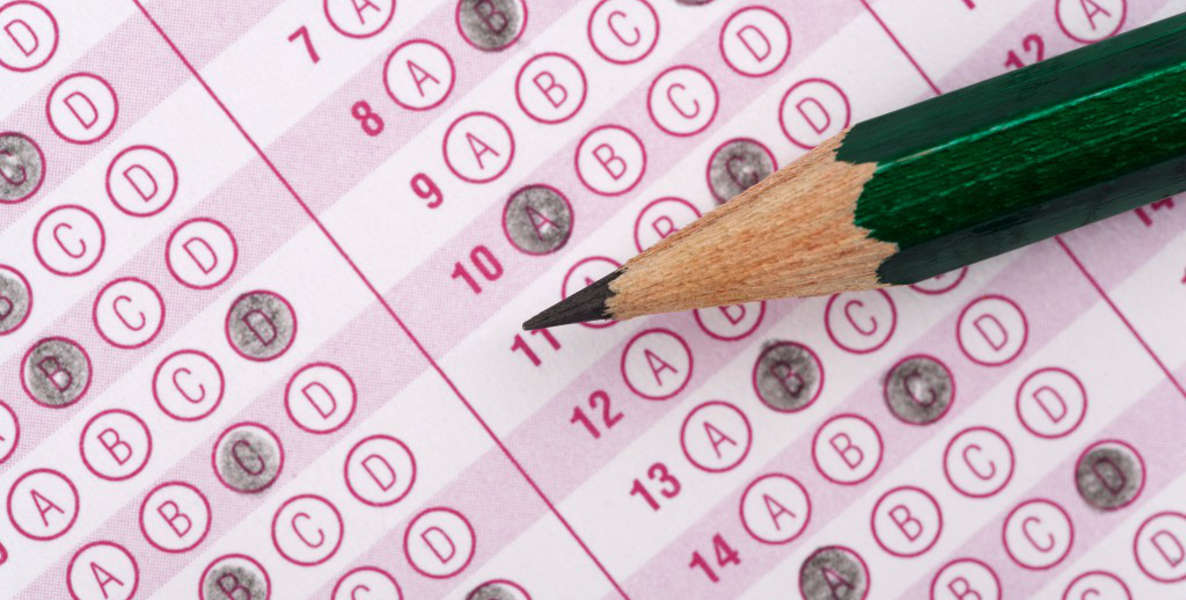[Ed. Note: This story was originally published on March 4, 2015. The Citizen is reposting it now, while public school students are again in the midst of taking state standardized tests. Since last year, the federal law governing schools has changed. Under the new Every Student Succeeds Act, oversight of schools goes mainly to state and local authorities, who will decide how much emphasis to place on test scores when judging schools. Some may opt for a broader approach—closer, though probably not to the same extent, as in England.]
In late January, when report cards came out at a local South Philly charter school, it was obvious to the parents of one third-grader that their daughter was a success: She got straight As; first honors; high reading and writing marks; comments from her teacher about her obvious affection for school and learning. So it was with some dismay that her parents listened a few days later, as their 9-year-old described the newest part of every school day: PSSA test prep.
“My teachers said it’s the most important test of the year,” she announced. “I’m nervous. What if I don’t do well?”
At Meredith Elementary—considered the city’s best public K-8—another academically-gifted third grader started spending her after school hours cramming test-taking strategies, nervously working out the best way to answer the PSSA’s often unclear questions. She knew from previous years that the school is counting on her: Students in grades not taking the tests are instructed to tip-toe by classrooms so they don’t bother their schoolmates.
As third-graders, this will be the first time in their academic careers that these girls take the Pennsylvania State School Assessment exams. It won’t be the last: If nothing changes, before they graduate, they will take 17 standardized tests, including the new Keystone Exam requirement for a high school diploma, starting with the class of 2017. That doesn’t count the dozens of practice tests and in-school “benchmark” assessments they’ll take to prepare them for the big test. And with each passing year, the stakes get higher—if not for the students, then for their teachers, the school, and the District, which budgeted over $58 million for testing this year. Test scores are the biggest part of the Pennsylvania School Performance Profile, which ranks every school in the state. They are the deciding factor in whether a school is underperforming or failing; whether parents want to send their children there; whether it might become a Renaissance school turned over to a charter company, which will replace at least half the staff; whether it will end up on the chopping block the next time the District needs to close schools.
It’s no wonder schools consider the test so important—and that teachers feel pressured to load up on test prep. Meanwhile, studies have shown that teaching to the test has had the opposite effect intended: Kids are doing worse on tests now, not better. The tests themselves are hopelessly 20th Century. “They measure rote learning, low-level skills, how much test prep a student has had and family background,” says Monty Neill, executive director of FairTest, which advocates for better and fewer tests. “That’s not what our kids need if they’re going to be successful today.”
And using test scores as the primary indicator of a school’s success? It’s narrow-minded, at best. “Testing is important to provide some information about how well children are learning,” says Sigal Ben-Porath, a Penn education professor. “But by themselves they don’t give us a direction for action. So we know if kids in Philly can’t read well enough according to the PSSAs, but we don’t know what to do about it. For that, we need to look beyond the test scores, to what the school is doing at a broader level.”
In England, inspectors interview students, teachers, parents and administrators; review projects and schoolwork; and sit in on classes—the most important aspect of school assessment. They also evaluate test results—but it’s only one piece of the puzzle.
There is another way. In England, schools are evaluated by—just imagine—actual visits to schools by a group of professional educators under a system wonderfully called Her Majesty’s Inspectorate of Education. (Holland, New Zealand and other places have a similar system.) Over the course of a day or two, inspectors interview students, teachers, parents and administrators; review projects and schoolwork; and sit in on classes—the most important aspect of school assessment, according to the British agency that oversees school quality. They also evaluate test results—but it’s only one piece of the puzzle. They then submit reports that not only grade the schools, but also provide feedback and recommendations for how to improve teaching and school culture. “A system like this allows us to get a very rich picture of what’s going on at the school, and allows them to help the schools reach their goals,” says Ben-Porath.
Would it work here? One group of schools in the city already undergoes this sort of inspection every five years: Charters. As part of their license renewal process, charter schools submit lengthy reports to the District, which then sends a team of inspectors to visit the schools over the course of a couple days. Those inspectors—usually a combination of charter office employees and national consultants—interview staff, parents and students; visit classrooms; review curriculum and classwork; study enrollment procedures; and evaluate test scores. Their recommendation to the District includes an analysis of a school’s strengths and weakness, including sometimes areas in which the school needs to improve before the license should be renewed. This process could be more transparent, and more effective—charter schools are notoriously difficult to close, even if they are not notably successful—but it is a model that could be replicated District-wide.
At Feltonville School of Arts and Sciences, more than 100 students opted out of testing, after two teachers informed parents of their rights and helped them navigate the process. Superintendent Bill Hite said the District would start distributing FAQs about how to opt out to all parents.
At least in theory. The District is beholden to standards set down by the state and federal government, whose No Child Left Behind legislation sent us into this national test-taking vortex. Until there is a wholesale change in policy beyond Philadelphia, it will be hard to implement a system that downplays the importance of test scores. That change could be coming, with Republicans in Congress leading the push to give states greater freedom in how they assess school success—which means Pennsylvania could decide how heavily to weigh test scores when judging Districts, schools and teachers. The new law is unlikely to limit the numbers of yearly tests—which Education Secretary Arne Duncan insists are needed—but it could make them less everything so teaching can again be about teaching, not about testing.
In the meantime, some districts around the country have started to broaden the way they judge schools. The Tacoma, Washington, school district two years ago launched a “whole child” system of school assessment that looks at dozens of factors—including social and emotional learning, in addition to test scores. Some districts in California also measure social-emotional learning, as well as school climate. Neill says some scattered schools around the country—in Rhode Island and Kentucky, for example—have piloted inspection programs, though not on a wide-scale. In Philadelphia, Ben-Porath posits that the city could call on its universities to help devise—and maybe implement—a school inspection program.
The issue seems to have reached a boiling point this year. State Sen. Andy Diniman proposed legislation to stop the Keystone Exam—pushed through by Gov. Corbett—from taking effect because of the inequity between rich and poor districts in Pennsylvania. Increasing numbers of parents around the country are protesting the high stakes nature of tests by helping their children “opt out” of testing, including in Philadelphia. At Feltonville School of Arts and Sciences, more than 100 students are refusing the test, after two teachers informed parents of their rights and helped them navigate the process. Elsewhere in the city, information sessions online and in person have drawn dozens of parents—including to a Home and School Association meeting at the District itself. In late February, Superintendent Bill Hite addressed the concerns by saying the District would start distributing FAQs about how to opt out to all parents. And even Arne Duncan said a few weeks ago that we should spend less time preparing for tests.
Maybe, just maybe, things are starting to swing back.








